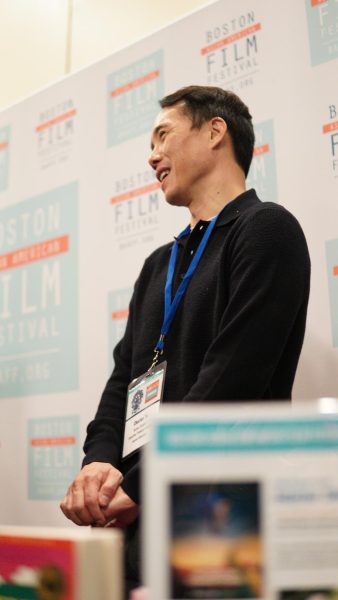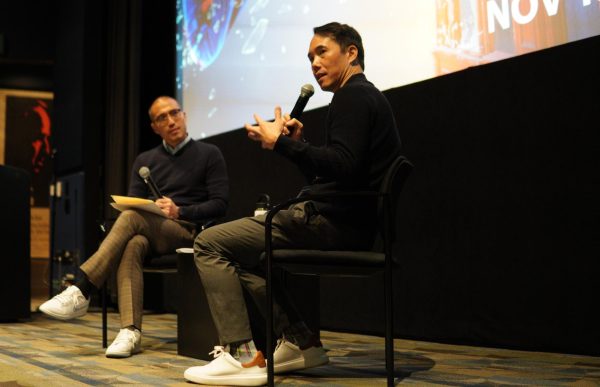
Taiwanese American author Charles Yu‚Äôs National Book Award-winning novel, ‚ÄúInterior Chinatown,‚Äù lept off the page, literally‚Äîhe adapted it for television. The pilot episode, show-run by Yu himself with direction by Taika Waititi, closed out the Boston Asian American Film Festival program with a screening at Emerson‚Äôs Paramount Theater on Oct. 26. As of yesterday, the full 10-episode series is available for streaming on Hulu.¬Ý
CHINATOWN‚Äîbeing ‚ÄúKung Fu Guy‚Äù isn‚Äôt exactly everyone and their mother‚Äôs cup of tea, unless you‚Äôre Bruce Lee, or the fictional equivalent in Yu‚Äôs proxy neighborhood Port Harbour, ‚ÄúOlder Brother,‚Äù a character who, in the book, isn‚Äôt necessarily related to the main character Willis Wu; but more like a personification of the golden child trope: six-pack abs, daddy‚Äôs favorite, academic weapon, etc.¬Ý
And even though everybody loved him more than Willis, no one loved him like Willis‚Äîthe little brother who wanted to be like him so badly he practiced kung fu every day, and he still does, years after “Older Brother” mysteriously disappeared. Being ‚ÄúKung Fu Guy‚Äù simply stood out too much, and his absence might be why most Asian people living in Chinatown aren‚Äôt interested in fighting, settling instead for nondescript roles like ‚ÄúDelivery Guy,‚Äù ‚ÄúInvisible Man,‚Äù or in Willis‚Äô case, ‚ÄúGeneric Asian Man.‚Äù
It‚Äôs not like Willis can‚Äôt stop being a caricature, it‚Äôs more like something beyond his control won‚Äôt let him stop. He keeps repeating his lines at the Golden Palace restaurant‚Äîand while his co-workers don’t care, his best friend, Fatty Choi, played by senior correspondent to The Daily Show Ronny Chieng, who‚Äôs committed to his role as ‚ÄúLowlife Oriental,‚Äù begrudgingly hears him out. As the latter smashes buttons over a rickety Street Fighter-esque arcade console called ‚ÄúNeighborhood Rumble‚Äù in the break room, Willis, played by Hong Kong American comedian Jimmy O‚ÄôYang, locks in to the crime procedural on TV.
The show he‚Äôs watching, called ‚ÄúBlack & White,‚Äù parodies ‚ÄúLaw & Order,” tailing two detectives, the Black one, Miles Turner, and the white one, Sarah Green. In these shows, Asian people are either victims or witnesses‚Äîso it seems like fate when Willis sees a woman get abducted while taking out the trash and Green and Turner happen to be investigating her case, identifying a local nail salon worker found dead‚Äîwho‚Äôs actually been alive this whole time because the cops were never Chinatown experts. As a result, Chloe Bennet‚Äôs character, Lana Lee, joins the duo as their ‚ÄúChinatown Expert‚Äù‚Äîonly she isn‚Äôt either, she just knows Willis is.¬Ý
And suddenly, the generic Asian man in the background of someone else‚Äôs story became a lead character, breaking every rule about Asians in the media. For the longest time, we only had one seat at the table and Bruce Lee sat in it‚Äîhe was the only guy who could look like us and also be cool because white people thought kung fu was cool.¬Ý
So we all grew up wanting to be ‚ÄúKung Fu Guy‚Äù‚ÄîYu recalls going through the motions in his living room with the VHS cassette tape on TV before him‚ÄîI‚Äôm not sure what he was training for then, but we agreed it‚Äôs bigger than the both of us now.¬Ý
But ‚ÄúKung Fu Guy‚Äù celebrates Asian Americans for our ‚Äúsuccessful assimilation‚Äù by confining us to the loneliest pedestal ever, reinforcing the idea that we should be seen but not listened to, succeed but not triumph, fight but not win‚Äîand that we should be grateful to even be Americans.¬Ý
Willis realizes this isn‚Äôt what he really wants, it‚Äôs a myth. Especially when his dad, who plays ‚ÄúSifu,‚Äù or kung fu teacher, though never the role of ‚ÄúAsian Father,‚Äù reveals how unlike ‚ÄúOlder Brother,‚Äù he specifically trained Willis to lose, it‚Äôs safer that way‚Äîhe‚Äôs not there to win, Willis is there to make the other guy look good. And that broke his heart.¬Ý
‚ÄúThat became my dream, to be that guy, the Kung Fu Guy, and now you‚Äôre telling me to not be that guy? What am I supposed to be?‚Äù Willis‚Äô voice breaks and ‚ÄúSifu‚Äù does not apologize‚Äîhe fulfilled his role perfectly.¬Ý
The answer—be more.

For decades, Yu‚Äôs Chinatown was seemingly at the epicenter of crime in Port Harbour‚Äîa detail he noted while researching media coverage of American Chinatowns in the ‚Äò70s: Back when newspapers portrayed them as hubs for gang activity, and the police, who read the white press, believed it.¬Ý
‚ÄúBlack & White‚Äù is no exception‚ÄîTurner and Green always end up sensationalizing Chinatown, but because the story gets told from Willis‚Äô point of view, it‚Äôs confusing when it happens. Chinatown is not an exotic, freaky Friday foot-massaging destination for boba drinking, karaoke singing, and lo mein lunch specials‚Äîpeople live here just like everybody else, and they‚Äôre not foreigners either. But to white people, Willis is invisible, and the only time ‚ÄúBlack & White‚Äù acknowledges Chinatown‚Äôs residents is when they fit the white narrative‚Äîeither as informants, or when they‚Äôre actively being arrested.¬Ý
The procedural explains Dr. Claire Jean Kim’s Racial Triangulation theory: putting Asians on the backburner of racial equity because we’re already the model minority, so we might as well be equal. News flash, we never were.

Yu‚Äôs first short story, titled ‚ÄúThird Class Superhero,‚Äù was about a superhero applicant named Moisture Man who keeps getting rejected from the big leagues, a self-insert character for him back when his mailbox used to be full of rejection letters from literary magazines.¬Ý
‚ÄúThat was one of my first stories,‚Äù said Yu. ‚ÄúI was writing from personal experience of feeling like I was trying to get into a system that doesn‚Äôt really want me.‚Äù¬Ý
And it‚Äôs not like ‚ÄúInterior Chinatown‚Äù happened overnight either, especially with its author so involved in writing, shooting, and post-production. Yu emphasizes showing up and supporting Asian American projects‚Äîthere were many times when he had to explain why certain details were kept the way they were in meeting rooms that were mostly white.¬Ý¬Ý
“I got to show run this project because there are more Asian producers and executives now—they’re like gatekeepers who can help me make things and open doors,” said Yu.
Like when Lisa Joy and Jonathan Nolan at HBO hired him to write for “Westworld”—back when Yu was still in between careers as a lawyer and a novelist. Or when author Jim Gavin let him in on his writer’s room for AMC’s “Lodge 49,” which was an adaptation of Gavin’s own short stories—and Yu recalls the experience as a helpful retrospective for making his own show after watching another writer do it firsthand
BAAFF director Susan Chinsen says stories often become Asian American ones because they’re about those people who look the part, but that should go without saying—the most important thing about showing media like “Interior Chinatown,” is about showing people’s lives who were meant to exist in the margins, and make them, well, interior.